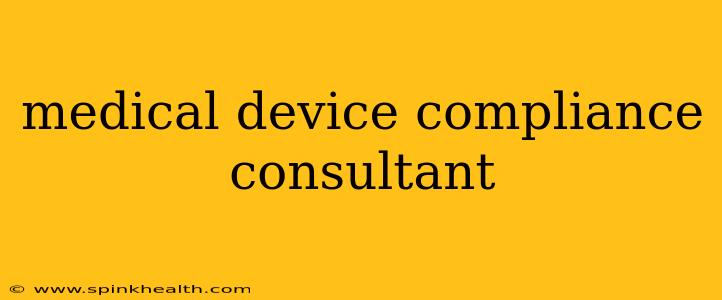The sterile scent of a hospital operating room might not be the first thing that springs to mind when you think of a medical device compliance consultant, but for me, it's a constant reminder of the stakes involved. My work isn't about the gleaming technology itself, but the intricate web of regulations that ensure its safe and effective use. It's a world of meticulous detail, where a single oversight can have life-altering consequences.
My journey into this field began with a fascination for the intersection of technology and healthcare. I've always been captivated by how innovation can improve lives, but also acutely aware of the potential risks if things aren't done correctly. Medical device compliance is the critical bridge, the meticulous process that guarantees patient safety while allowing for advancements in healthcare.
What Does a Medical Device Compliance Consultant Actually Do?
This isn't a desk job; it's a dynamic role demanding a broad skillset. One day I might be poring over regulatory documents, deciphering the complexities of the FDA's Quality System Regulation (QSR) or the EU's Medical Device Regulation (MDR). The next, I could be on-site at a manufacturing facility, auditing processes and training staff. My work involves a blend of strategy, analysis, and hands-on implementation.
My primary role is to help medical device companies navigate the challenging regulatory landscape. This includes:
- Regulatory Strategy Development: Guiding companies in creating and implementing compliant strategies that align with global regulations. This means understanding the specific requirements for different markets and product classifications.
- Quality System Audits: Performing thorough audits to ensure the company's quality management system (QMS) meets the necessary standards. This includes reviewing documentation, observing processes, and interviewing staff.
- Risk Management: Helping companies identify and mitigate potential risks associated with their devices. This is crucial for patient safety and regulatory compliance.
- Training and Education: Providing training to company staff on regulatory requirements and best practices.
- Documentation Review: Ensuring all necessary documentation is accurate, complete, and compliant with regulations. This is often a very time-consuming, but essential, part of the job.
- Submission Support: Assisting companies with the preparation and submission of regulatory filings. This can involve a great deal of coordination and technical expertise.
What are the Main Challenges Faced by Medical Device Compliance Consultants?
The landscape is constantly shifting. Regulations are frequently updated, requiring ongoing learning and adaptation. Keeping up-to-date with the ever-changing rules and interpretations is a constant challenge.
Furthermore, each medical device is unique, meaning the compliance requirements can vary drastically. A simple bandage requires a different level of scrutiny than a complex implantable device. This requires a deep understanding of the device's functionality and intended use.
What Qualifications and Skills are Necessary to Become a Medical Device Compliance Consultant?
While the specific requirements can vary, a background in engineering, science, or a related field is generally beneficial. A deep understanding of medical device regulations (FDA, ISO 13485, MDR, etc.) is crucial. Practical experience in the medical device industry is a significant advantage, as is possessing strong analytical, problem-solving, and communication skills.
How Much Does a Medical Device Compliance Consultant Earn?
Compensation can vary significantly based on experience, location, and the specific role. However, it's a well-compensated field offering competitive salaries and benefits.
How Can I Become a Medical Device Compliance Consultant?
There's no single path; some enter the field with years of experience in quality assurance or regulatory affairs within the medical device industry, while others transition from related fields, leveraging existing skills and pursuing additional certifications. Networking within the industry is key, as is continuous professional development to stay ahead of the ever-evolving regulations.
What is the Future of Medical Device Compliance Consulting?
With the increasing complexity of medical devices and the globalization of healthcare, the demand for experienced and knowledgeable compliance consultants is expected to grow significantly in the coming years. The field is dynamic and challenging, demanding constant learning and adaptation. It's a rewarding career for those passionate about ensuring patient safety and facilitating innovation in healthcare. The future looks bright—and rigorously compliant.

